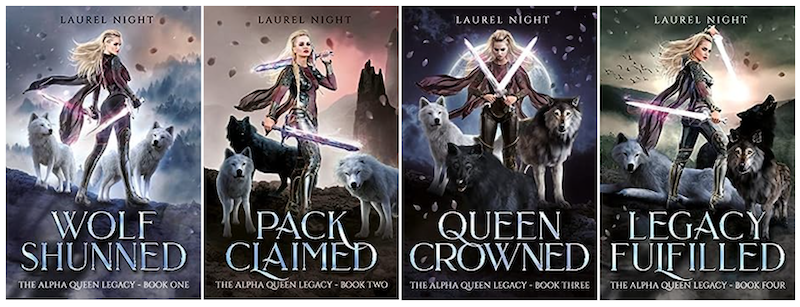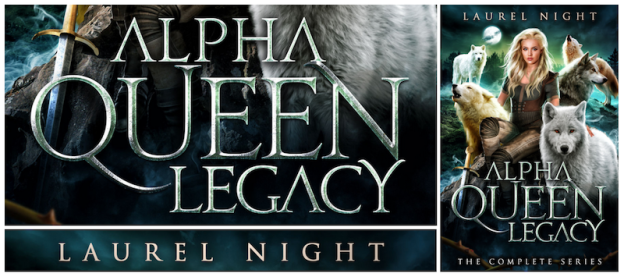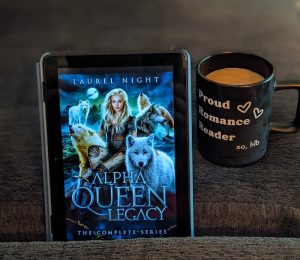I picked up Laurel Night‘s Wolf Shunned, the first book in the Alpha Queen Legacy series, as an Amazon freebie. I then bought the omnibus of the series so that I could read Pack Claimed, Queen Crowned, and Legacy Fulfilled.

It’s amazing to be a powerful wolf… if you’re male.
When you’re a nineteen year-old girl who can beat the crap out of every wolf in your pack, suddenly it’s not so great.
Love isn’t everything, I know; but even the most powerful she-wolf submits to her mate. If you can’t be beaten, you can’t be mated.
And an unmated wolf has no place in the pack.
My one hope is the clan gathering in the Blackwood Fortress. Every wolf in the continent attends, and a few seriously sexy wolves catch my eye. I’m bound to find at least one who can match me, right?
Then there’s my other problem: My pack leader is a grade-A jerk. After treating me like a genetic freak my whole life, he suddenly decides to stake a claim. But I can’t refuse the challenge, and my wolf won’t back down. Either I submit to the pack leader and become mated to his skeezy pelt, or I win the challenge and my freedom… by taking his place as pack leader.
Only no one has ever heard of a female pack leader, and if I become one, I’ll never find a mate.

With a few exceptions (which I will address), I really enjoyed book one of this series. I finished it excited to continue the story. However, that excitement wained as the series draggggggggs. Time went on. Days went by, in fact, where I just couldn’t seem to find the end. This despite the plot events slowing down and getting repetitive. I started dreading having to pick the book back up. I honestly think the author could cut enough chaff to reduce the series by an entire book! I never quite got to the point of disliking it. But I sure did get awfully bored.
The writing is clean and easy to read though, and I liked the characters well enough (individually and together). I liked that the men became family among themselves, as well as with Kali. A significant chunk of the books is about them learning to give up their toxic machismo, follow a woman, and come to accept that having some softness doesn’t make them weak. I thought Night addressed some surprisingly heavy topics in intelligent ways throughout the series.
There is surprisingly little sex in the series. It’s not fade to black, but there are not many sex scenes, and none of them are particularly explicit. I definitely wouldn’t call them overly erotic. (All but one of them is a virgin. So, no one knows enough to really get down from the get-go, and no single male mate gets more than one sex scene.) So, those looking for a Why Choose on the “cleaner” side could read this fairly comfortably. (But those looking for a spicy read will likely be disappointed.)
In the beginning, my biggest complaint was the age of the characters. They are all 19, weeks from turning 20. (Something important happens at 20.) Nothing about any of the characters feels 19. Most of them are the leaders of their clan, some having been so for years. They are experienced, jaded, and authoritative in a way that feels at least 35, not 19. This is addressed in the narrative with wolves maturing faster, etc. But it still yanked me out of the narrative over and over again because they so very much do not feel the age they are meant to be. (Plus, maturing faster means things like mating and bearing children are shifted back several years to accommodate, too, and that’s just icky. Especially since the characters are appropriately uncomfortable with 15-year-olds having babies, which counters the whole ‘matures early’ narrative to accommodate modern Western ideals.)
My biggest complaint, however, is not a plot point, per se (though it sure feels like one). I’m not making any allegations against the author, but I do want to acknowledge that there is something seriously hinky going on with race in the books. We’re repeatedly told the heroine is unusual and stands out as more beautiful than anyone else because she is fair-skinned, blonde, and blue-eyed. We are explicitly told that most people are dark (haired, eyed, skinned). So we have a ‘not-a-drop’ blonde who is more beautiful, powerful, and dominant than anyone else, coming to save (and rule) all the muddle skin/hair/eyed people. Read that as not white, though that terminology is never actually used. Even the single explicitly coded black man is never referred to as such.
And if this was just a time or two, I might not say anything. But this happens over and over again. The heroine has five mates, so there are five opportunities to talk about someone seeing her for the first time, narrative descriptions of the societies in general—five different clans, actually—and just a plethora of chances to admire Kali’s looks (imagine Kali from the Game of Thrones show and you’ll be in the ballpark) and talk about people and their looks.
I picked the pattern up fairly early and couldn’t stop seeing it. But then it got worse. [This is a little bit of a spoiler.] The main characters are post-apocalyptic, genetically non-human werewolves. At some point, the group discovers that there are, in fact, still some true humans secretly alive. And, you guessed it, while they aren’t as striking as Kali, their limited genetic gene pool leaves them all fair and blond, and their circumstances have them miles above and beyond the primitive wolves technologically. The only true humans in the book are blond/white (and Christian, as it happens), while the non-humans are not. In fact, Kali even asks if there could have been some intermating between the humans and the wolves since she looks like the humans more than the wolves.
I don’t know that the author made purposeful racial associations here, but she did make them, and it is not even subtle. Frankly, I don’t know if internalizing such racial biases to the degree they slip through into your writing by accident is truly better than doing it on purpose. Lastly, before you consider coming for me to argue such explicit worship of the blond doesn’t necessarily mean white, read some Tressie McMillan Cottom, who writes about blonde as a signifier of race. Or here, have a TikTok primer that crossed my feed with truly miraculous timeliness as I formulated this review:
@daniellamestyanekyoung
I also thought that the wolf/shifter aspect of the plot was underutilized. The wolves play very little part in the story. As a result, I kind of feel like the characters could have been genetically modified in ways that would make a lot more sense—just stronger, or heartier, or bigger humans, for example—without going all the way to able to shift into wolves and it would have been a stronger plot element.
All in all, I was super icked out by the race issue, but otherwise enjoyed book one and was apathetic about the last three. I didn’t hate them, but they didn’t light me on fire either.
Other Reviews:

